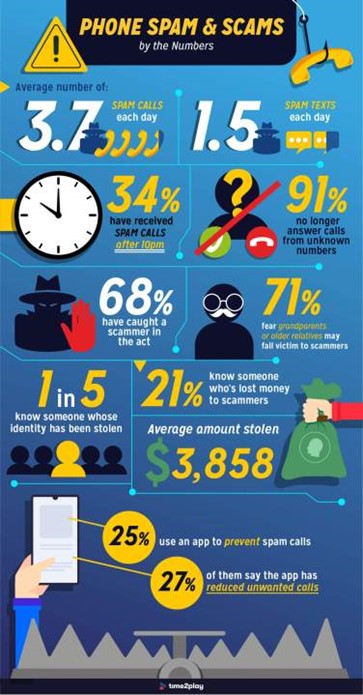Posted On: May 22, 2024 by Prevail Bank in: Digital Banking Fraud

Voice scams – 14 ways to protect yourself
Voice scams (live phone calls, texts, voicemail messages) are typically unsolicited messages that promise or threaten something “big”, and you have a very short time frame to either claim the prize or respond to the alleged problem. According to a 2023 McAfee Global Scam Study, the most common scams are:
- “You’ve won a prize!” – 72%
- Fake job notifications or offers – 64%
- Bank alert message– 52%
- Information about a purchase you didn’t make – 37%
- Netflix (or similar) subscription updates – 35%
- Fake missed delivery, or delivery problem, notification – 29%
- Amazon security alert, or notification messages regarding account updates – 27%
 According to a 2022 study by Ben Treanor published in Time2play, the nationwide average for the number of spam calls per day is 3.7; spam texts average 1.5 per day.
According to a 2022 study by Ben Treanor published in Time2play, the nationwide average for the number of spam calls per day is 3.7; spam texts average 1.5 per day.
Graphic and data courtesy of Time2play
and Ben Treanor.
Scams that come to you as text messages typically include a link. Some links may download malware onto your device, while others will lead you to a lookalike website that will try to get you to input your personal information. Other scammers want you to call a number and when you do, you will meet an expert persuader and manipulator.
Some people are receiving phone calls that sound like the panicked voice of a friend or relative claiming to be in trouble, and they need money or information fast so medical treatment, bail, or something else can be arranged at that moment. It’s a new twist on the “grandparent scam”. If the replicated / cloned voice convinces you to send money through a digital wallet like Venmo or PayPal, your money is gone.
It’s hard not to react. It’s human nature to protect ourselves, our property, and those we love, but DON’T do it – at least not at that exact moment. Stop. Breathe. Think.
In the past, we just needed to worry about scammers who could clone websites, and corporate emails and invoices. But now, artificial intelligence (AI) technology provides the bad guys with the ability to clone voices and manipulate videos/photos to look like the real deal; otherwise known as deepfakes. These scammers are experts at manipulating our emotions and trust. And when our emotions and anxieties are high, our ability to think rationally goes out the window.
Stay calm, think, question the validity, and protect yourself from falling victim to these deceptive AI voice & video scams.
What should you do to protect yourself?
Voice scams are challenging to identify. Here are 14 ways to help protect yourself.
- Send unknown numbers to voicemails.
- Use Reverse Phone Number Search technology.
- Do not respond to unwanted texts.
- Join the Do Not Solicit list.
- Use a spam blocking app for texts & calls.
- Verify.
- Establish a family password.
- Be aware of the press a button trick.
- Never share personal information.
- Avoid Yes/No questions.
- Report and block spam numbers.
- Avoid online competitions and sweepstakes.
- Establish multi-factor authentication for your online financial's & voicemail.
- Be thoughtful as to what you're positing publicly online.
1. Send unknown numbers to voicemail.
If you receive a call from an unknown number, send it to voicemail. Answering scam calls often leads to more nuisance calls, because at the very least scammers will peg you as a person who is willing to talk to a stranger; eventually, you’ll fall for a scam and your personal information will be theirs.
If they leave a voicemail urging you to call them back. Ignore the voicemail and call the organization they claim to be associated with directly. Use a number YOU have in your possession from a past encounter or account statement. NEVER call the number that is left by them.
2. Use Reverse Phone Number Search technology.
Reverse phone number searches will reveal where the call originated, in addition to the caller’s name or company. Some reverse number services will tell you if the phone number in question has been associated with scams and fraud.
To conduct a reverse look-up for FREE, CyberGuy.com says:
- Try typing the phone number into Google. It may pop-up a response that says the number has a high probability of being a scam call.
- Consider the FREE version of the TrueCaller app. It works for both iPhone and Androids. It identifies people and businesses that you don’t have saved in your phone. You can also look-up numbers in a search bar to see if they are legit.
- The Reverse Lookup app will let you manually type in a phone number; you’ll receive the names and specific locations connected to that number.
- And the FREE version of Whitepages.com (for iPhone only) will give you the carrier, the type of number calling you, and a notation if the number is potentially spam/fraud.
3. Do not respond to unwanted texts.
The Federal Communications Commission (FCC) has made it illegal to send autodialed text messages unless you previously gave a company the consent to do so. If you receive a text from a questionable source, do not respond says the FCC.
The FCC also recommends blocking the sender by forwarding unwanted texts to 7726 (or “SPAM”).
4. Join the Do Not Solicit list.
Granted, bad guys don’t follow the rules/law, but if you did add your phone number to the do not call list, it would cut down on the number of unsolicited (legitimate) telemarketing calls you’d receive. Robocalling (which means a computer is autodialing phone numbers) with an artificial voice message is illegal unless the company has your written permission to contact you in this manner.
To register your phone number to the national do not call list to block telemarketing calls AND to report illegal robocalls go to, DoNotCall.gov.
5. Use a spam blocking app for texts & calls.
Install a scam call blocking app to add an extra layer of protection against nuisance calls. These apps compare incoming numbers against a database of known scam callers.
6. Verify.
Always confirm that what you hear/receive is true before responding. Hang-up and call your loved ones back directly or check their well-being through other means. If someone claims to represent a company or government agency, hang up – even if they are threatening immediate action against you, and verify the legitimacy of the claim by calling the phone number from your account statement or corporate website.
If a call or text has spelling or grammar errors, seems too urgent, too good to be true, or too suspicious --- especially if it involves money --- it probably is. Don’t believe everything you see or hear.
Related to this, don’t make financial decisions based on viral videos. If a celebrity insists you invest in bitcoin, donate funds to a specific charity, or receive a product for only the cost of shipping, do some research first. (The Better Business Bureau (BBB) has some great tips on six things to look for when shopping online and how to shop smart online.) Scammers may be using AI technology to impersonate someone you trust. They want your credit card information; don’t give it to them.
Take a closer look at the video. The poor quality ones are easy to identify because they either have blurry spots in the video, double edges around a face, the lighting or quality of the video changes during the video, and/or people in the video are not blinking. If you notice any of these circumstances, you’re probably watching a deepfake. Fake audio may have choppy sentences, odd phrasing, or background noises that don’t match the speaker’s location.
Sidenote: Since this is an election year, we can probably expect scammers to use AI technology to mimic candidates’ voices and images to sway votes or acquire ‘donations’. Be diligent; validate before responding or sharing.
7. Establish a family password.
Establish a family password that only you and your closest inner circle would know. Use it to confirm emergencies.
8. Be aware of the press a button trick.
If a caller or a recording asks you to press a button to stop receiving calls, hang up. Scammers use this trick to find potential targets.
9. Never share personal information.
Never share personal information (account numbers, social security numbers, passwords) with an unexpected call/caller. If YOU initiated the call, using a trusted number, that’s different.
10. Avoid Yes/No questions.
“Can you hear me now?” or “Is your name ____” scam has been targeting consumers for a long time. The scammer’s goal is to get you to say “Yes,” which most people do instinctively. Your “yes” answer, if recorded, could later be edited to make it sound like you authorized a major purchase, or it confirms your phone number is real. The BBB recommends you just hang up.
11. Report and block spam numbers.
Report any scam numbers to BBB.org/ScamTracker to help warn others. And then, from your electronic device /mobile phone, report the number as JUNK and then BLOCK it.
12. Avoid online competitions and sweepstakes.
The internet is full of questionaries, surveys, games, and contests designed to acquire your personal information. Resist the temptation to play.
13. Establish multi-factor authentication for your online financials & voicemail.
Multi-factor authentication prevents scammers from using your likeliness or voice to hack your accounts.
14. Be thoughtful as to what you’re posting publicly online.
According to the BBB, the only way a scammer can impersonate you and make a seemingly real video or audio clip is if they have access to a selection of photos and videos featuring you.
Scammers can manipulate what you see on your Caller ID too!
Phone spoofing is the practice of using fake caller ID information (usually a trusted organization’s name (McAfee, Microsoft, Kohls, UPS … Or, it could be a friend or relative’s information) to increase the likelihood that a call will be answered. Again, always be cautious and wary. The scammer’s goal is to acquire your personal information so it can be used in fraudulent activity.
If you answer the call and there is a sense of urgency for you to provide personal or financial information, the Better Business Bureau recommends:
- Resist the urge to act; no matter how convincing the phone call or voicemail may sound.
- Ask questions that would be hard for an imposter to answer correctly.
- Hang up or close the message if something doesn’t feel right.
- Call the person who claimed to have called you BUT use the phone number YOU have saved for them. Do not call the number provided by the caller or caller ID.
If you think your name and number (your caller ID information) is being used for spoofing purposes, Avast recommends:
- Recording a new voicemail message, so callers are aware you are not the true source of the nuisance.
- Blocking and silencing all unknown incoming numbers.
- Filing a complaint with your local authorities and the FCC. The FCC investigates phone spoofing consumer complaints.
Bottomline, phones are a potential goldmine for hackers seeking access to your finances, private information, and other sensitive data. Seriously consider a cybersecurity app for any device that accepts calls or texts.
Prevail Bank would never call, text, or email customers asking for private information.
Prevail Bank’s website has a ‘Digital Banking – Digital Security’ blog category that includes articles relating to cybersecurity, impersonation emails, phishing scams, and identity theft protection. Check them out.





